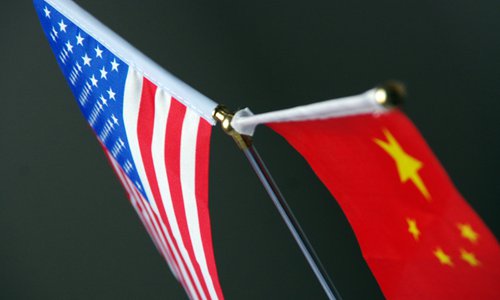HOME >> OPINION
Amid debilitating trade war, silent majority key to stabilizing China-US ties
By Zhang Jiadong Source:Global Times Published: 2019/6/18 19:58:40

Photo: IC
With trade disputes and Huawei row in the forefront of ties, China-US relations have seen unprecedented tensions. Strategic competition between the two powers has drawn global attention. Why has the US policy toward China changed? Are relations heading toward a new cold war? Should China adjust its strategy to assimilate with the new international environment?There have been changes in the US policy and public opinion on China, which may harm bilateral relations. As China rises, the mind-sets of Chinese and American scholars have also changed. American scholars are increasingly alert over China's strategic intentions and measures, with criticism of the East Asian power rising. For Chinese scholars, the criticism is becoming unacceptable. They believe that China needs to voice its side of the story. As a result, Chinese and American scholars find fewer common grounds at international conferences and in the global arena.
Under such circumstances, some American China hands have also changed their attitude. Once supporters of China-US cooperation, these people are now doubtful of and even against such bilateral contacts. Other American people who know China well choose to lie low, or are deprived of opportunities to make their voices heard. Anti-China Americans have dominated Washington's public opinion on Beijing. Some China hands even believe that although anti-China Americans' thoughts and actions may be wrong, they may help China change. This is actually indulging anti-China forces in the US.
Besides, right-wing forces have a larger say in the Trump administration. Other factions are not willing to join the government, or have been excluded. Thus, an unusually small group is formulating China policies of the US. This has shaped the narrative that the US is trying to suppress China.
But the silent majority still exists in the US. This group is comprised of China hands and centrists. They are on the same page with the administration on certain issues. For example, they all believe that China's rise and ideology may exert strategic pressure on the US. However, their worldview differs from the current US administration's. The silent majority adheres to liberalism, equality, protection of minority groups, balance between country and society, and between government and business. It is therefore against some major policies of the administration.
Boosted by populism, anti-China sentiment is acquiring notions of political correctness. Although the silent majority prefers to keep a low profile, it acts to restrain the current administration's extreme impulses. This group is preventing China-US relations from escalating into a full-blown confrontation, a cold war or a "hot war."
History shows that the US may adopt extreme policies because of fear. The Chinese Exclusion Act of 1882 and McCarthyism after WWII are both examples of US politics partly going to extremes within a short period. But it has not stretched to extremes in the long run. A diversified society and democratic ethos are still the basis for people to understand US politics and its foreign policies.
China-US relations have indeed come under huge pressure. What should China do? The option is not in US hands, nor in control of extreme right-wing Americans but in the hands of the Chinese people.
The current change in the world has been mainly caused by China's rise and other countries' response to it. In five centuries, it is the first time China has become the inspiration for global change, and thus the Asian power should also be the source of resolving problems.
Many of the Trump administration's statements on China are one-sided, but at least one thing is correct: China joining the World Trade Organization was a juncture that changed the nation's international standing. This shows the meaning of deepening reform and opening-up.
China's development emanates from reform and opening-up. Changes in China-US relations, positive or negative, are the result of China's reform and opening-up. To address problems in ties with the US and the world, China should further strengthen reform and opening-up.
In the era of globalization, participation rather than protectionism is the best way to avoid risks. China has been combating US bullying. Trying to seek a consensus with the silent majority in the US and international society will be a good way to stabilize China-US relations and improve China's own international environment.
The author is a professor at the Center for American Studies, Fudan University. opinion@globaltimes.com.cn
Posted in: VIEWPOINT